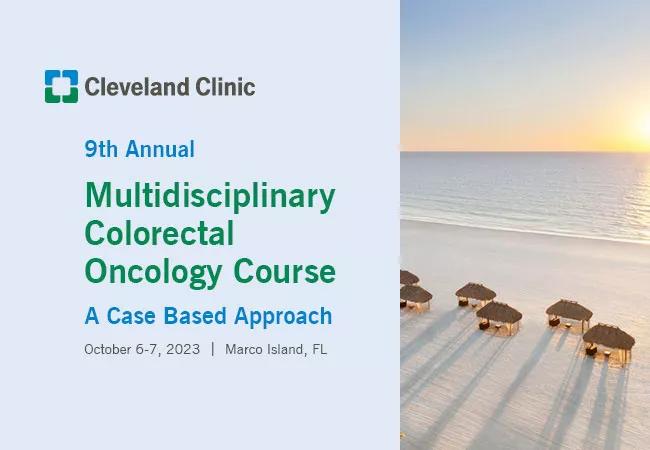Case-based course delves into latest treatment approaches

Image content: This image is available to view online.
View image online (https://assets.clevelandclinic.org/transform/6639138e-0c4e-4c32-8a15-3dc9ae842063/23-CNR-4185077-CQD-Hero-650x450-1_jpg)
23-CNR-4185077-CQD-Hero-650×450
Emerging diagnostics, therapies and procedures are improving the outlook for patients with colorectal cancer, yet this rapidly changing treatment landscape can be confusing. Similarly, healthcare providers are confounded by high rates of colorectal cancer in patients under the age of 50. The 9th annual colorectal oncology course, held at Marco Island, Florida on October 6-7, 2023, will feature panel discussions and Q&As with noted specialists across surgery, radiation oncology and genomics managing this complex disease.
Advertisement
Cleveland Clinic is a non-profit academic medical center. Advertising on our site helps support our mission. We do not endorse non-Cleveland Clinic products or services. Policy
“This essential update on the latest treatment changes in colorectal cancer will provide a multidisciplinary approach that’s crucial for disease management,” says Alok Khorana, MD, Director, Gastrointestinal Malignancies Program at Cleveland Clinic Cancer Center. “The program also brings focus to diagnosing and treating young-onset colorectal cancer.”
This two-day program is ideal for oncologists, surgeons, radiation oncologists, nurses and other healthcare professionals with an interest in treating patients with colorectal cancer. “For clinicians who may be too busy to attend large conferences, this national symposium a convenient way to get up to speed on everything that’s new in treating this disease.”
In this in-depth symposium, learners will gain a detailed look at a wide range of topics, including:
The live event is designated for a maximum of 8.25 American Medical Association PRA Category 1 Credits™ and 8.25 American Nurses Credentialing Center contact hours.
Advertisement
Advertisement
First-of-its-kind research investigates the viability of standard screening to reduce the burden of late-stage cancer diagnoses
Global R&D efforts expanding first-line and relapse therapy options for patients
Study demonstrates ability to reduce patients’ reliance on phlebotomies to stabilize hematocrit levels
A case study on the value of access to novel therapies through clinical trials
Findings highlight an association between obesity and an increased incidence of moderate-severe disease
Cleveland Clinic Cancer Institute takes multi-faceted approach to increasing clinical trial access 23456
Key learnings from DESTINY trials
Overall survival in patients treated since 2008 is nearly 20% higher than in earlier patients